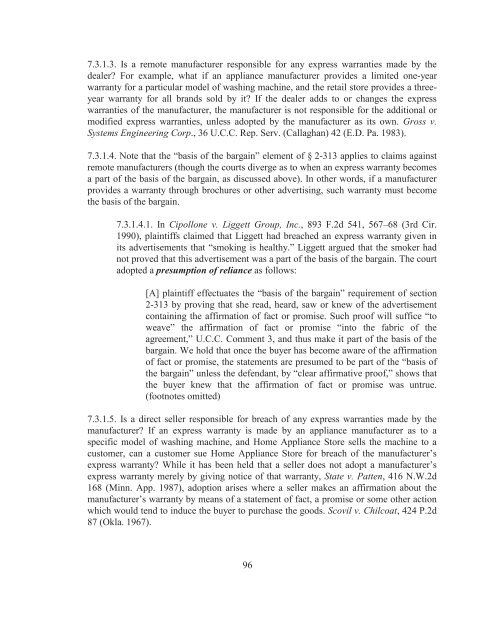Sales and Leases - A Problem-based Approach, 2016a
Sales and Leases - A Problem-based Approach, 2016a
Sales and Leases - A Problem-based Approach, 2016a
You also want an ePaper? Increase the reach of your titles
YUMPU automatically turns print PDFs into web optimized ePapers that Google loves.
7.3.1.3. Is a remote manufacturer responsible for any express warranties made by the<br />
dealer? For example, what if an appliance manufacturer provides a limited one-year<br />
warranty for a particular model of washing machine, <strong>and</strong> the retail store provides a threeyear<br />
warranty for all br<strong>and</strong>s sold by it? If the dealer adds to or changes the express<br />
warranties of the manufacturer, the manufacturer is not responsible for the additional or<br />
modified express warranties, unless adopted by the manufacturer as its own. Gross v.<br />
Systems Engineering Corp., 36 U.C.C. Rep. Serv. (Callaghan) 42 (E.D. Pa. 1983).<br />
7.3.1.4. Note that the “basis of the bargain” element of § 2-313 applies to claims against<br />
remote manufacturers (though the courts diverge as to when an express warranty becomes<br />
a part of the basis of the bargain, as discussed above). In other words, if a manufacturer<br />
provides a warranty through brochures or other advertising, such warranty must become<br />
the basis of the bargain.<br />
7.3.1.4.1. In Cipollone v. Liggett Group, Inc., 893 F.2d 541, 567–68 (3rd Cir.<br />
1990), plaintiffs claimed that Liggett had breached an express warranty given in<br />
its advertisements that “smoking is healthy.” Liggett argued that the smoker had<br />
not proved that this advertisement was a part of the basis of the bargain. The court<br />
adopted a presumption of reliance as follows:<br />
[A] plaintiff effectuates the “basis of the bargain” requirement of section<br />
2-313 by proving that she read, heard, saw or knew of the advertisement<br />
containing the affirmation of fact or promise. Such proof will suffice “to<br />
weave” the affirmation of fact or promise “into the fabric of the<br />
agreement,” U.C.C. Comment 3, <strong>and</strong> thus make it part of the basis of the<br />
bargain. We hold that once the buyer has become aware of the affirmation<br />
of fact or promise, the statements are presumed to be part of the “basis of<br />
the bargain” unless the defendant, by “clear affirmative proof,” shows that<br />
the buyer knew that the affirmation of fact or promise was untrue.<br />
(footnotes omitted)<br />
7.3.1.5. Is a direct seller responsible for breach of any express warranties made by the<br />
manufacturer? If an express warranty is made by an appliance manufacturer as to a<br />
specific model of washing machine, <strong>and</strong> Home Appliance Store sells the machine to a<br />
customer, can a customer sue Home Appliance Store for breach of the manufacturer’s<br />
express warranty? While it has been held that a seller does not adopt a manufacturer’s<br />
express warranty merely by giving notice of that warranty, State v. Patten, 416 N.W.2d<br />
168 (Minn. App. 1987), adoption arises where a seller makes an affirmation about the<br />
manufacturer’s warranty by means of a statement of fact, a promise or some other action<br />
which would tend to induce the buyer to purchase the goods. Scovil v. Chilcoat, 424 P.2d<br />
87 (Okla. 1967).<br />
96


















